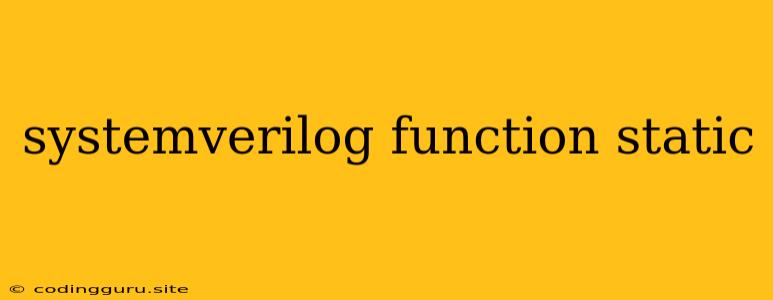Understanding static Functions in SystemVerilog
SystemVerilog provides a powerful set of features for creating and simulating complex digital designs. Among these features are functions, which allow you to encapsulate reusable blocks of code for performing specific operations. But what about static functions? How do they differ from regular functions, and why would you use them in your SystemVerilog designs?
What are Static Functions?
In essence, static functions in SystemVerilog are functions that belong to a class or module, but they do not have an instance-specific copy. This means that a single copy of the static function exists across all instances of the class or module, ensuring that changes made within the function are reflected globally.
Think of it this way: Regular functions are like individual tools in a toolbox, each tool having its own purpose. Static functions are like a shared toolbox, where everyone has access to the same set of tools.
Why Use Static Functions?
So, why would you use a static function instead of a regular function in your SystemVerilog code? Here are some key advantages:
-
Global Accessibility: As mentioned earlier, static functions are accessible by all instances of the class or module. This eliminates the need to pass data explicitly between instances when you need to perform a shared operation.
-
Data Sharing: Static functions can modify and access static variables within the class or module. This allows for efficient data sharing and synchronization across multiple instances.
-
Code Reusability: Similar to regular functions, static functions promote code reusability. You can call a static function from different parts of your code, eliminating the need to rewrite the same logic repeatedly.
-
Performance Optimization: By using static functions, you can sometimes reduce the amount of memory needed for your design, as only a single copy of the function is stored.
Examples of Static Functions in SystemVerilog
Let's look at some simple examples to illustrate the use of static functions in practice:
Example 1: Calculating the average of a list
class average_calculator;
static function int calculate_average(int[] list);
int sum = 0;
for (int i = 0; i < list.size(); i++) begin
sum += list[i];
end
return sum / list.size();
endfunction
endclass
module top;
average_calculator calc1;
average_calculator calc2;
initial begin
calc1 = new();
calc2 = new();
int list1[] = {1, 2, 3, 4, 5};
int list2[] = {6, 7, 8, 9, 10};
$display("Average of list1: %0d", calc1.calculate_average(list1));
$display("Average of list2: %0d", calc2.calculate_average(list2));
end
endmodule
In this example, calculate_average is a static function within the average_calculator class. It can be accessed by both calc1 and calc2 without requiring any instance-specific data.
Example 2: Using a static variable for global counter
class counter;
static int count = 0;
static function void increment();
count++;
$display("Counter value: %0d", count);
endfunction
endclass
module top;
counter c1;
counter c2;
initial begin
c1 = new();
c2 = new();
c1.increment(); // Counter value: 1
c2.increment(); // Counter value: 2
end
endmodule
Here, count is a static variable within the counter class. The increment static function is used to modify the shared count variable, ensuring that all instances of counter share the same counter value.
Considerations When Using Static Functions
While static functions offer a lot of benefits, there are some points to consider:
-
Potential for Conflicts: As static functions are shared globally, there's a potential for conflicts if multiple instances of the class or module try to access the same data or modify the same state simultaneously. This can lead to race conditions and unpredictable behavior.
-
Limited Use: Static functions are not always the best solution for every situation. If you require instance-specific behavior, a regular function may be more appropriate.
Conclusion
Static functions are a valuable tool in the SystemVerilog toolbox, providing a way to share logic and data across different instances of a class or module. By understanding their advantages and limitations, you can effectively utilize static functions to write concise, efficient, and reusable SystemVerilog code.
